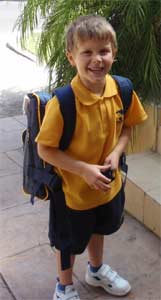Dealing with separation as children go to school

Dealing with separation as children go to school
Dr Cate Howell & Colleagues - Adelaide, South AustraliaThousands of children will be going to school this week and many of them, and their parents, will be excited or nervous. Many children will struggle with separation anxiety and there will tearful farewells. There is a lot to get used to, but there are many ways to make it a positive experience, Adelaide's Dr Cate Howell tells us how.A child realizes mum or dad are leaving and begins to cry and cling to them. The parents and the child feel distressed. This is a common scenario in the first week of school, and occurs because of separation anxiety, which can last from infancy through to the primary school years. Some separation anxiety is mild and can be managed through distraction and reassurance. Some is more persisting and distressing, and assistance from professionals might be needed.
Dr Cate Howell, medical practitioner, therapist, educator and author, suggests the following strategies to ease separation anxiety:
· Practice read stories about starting school, visit the school
· Be calm and consistent in your approach, talk positively about school
· Keep your facial expressions relaxed
· Let your child know that it is normal to have some nervousness, and that the butterflies will soon settle they will be helped by taking some medium breaths
· Use the same behaviours or words when you leave each time
· Leave the child with the teacher, or settle them into an enjoyable activity before leaving
· Show confidence in the child and reassure them you will be back
· Return when you say you will
· Avoid criticism, building confidence and self-esteem
· Give them time in the evening, or letting the child mind something of yours when you leave.
If you need further assistance, talk to your GP or Child and Youth Health.
For most children starting school, the nerves will soon settle. The key to settling into the new school year is to think positively, be prepared and allow some time to adjust.

Positive strategies for adapting to school
There are many strategies to assist settling into the new school year and to have a positive experience.1. Have a positive attitude
Focus on the positive things about going back to school, such as seeing old friends.
2. Involve and prepare your child
Preparing for school can be a fun time doing things together, eg. shopping for the uniform.
3. Be more available
In the first week, be more available for school drop-offs and settling in the classroom, as well as for pick-ups and chatting.
4. Communicate
Talk with children about any worries.
5. Establish routines
Establish the school-night routine in the weeks before school starts.
6. Get yourself organized before school starts
Make sure all the necessary supplies are obtained in time for school, and fill out any forms.
7. Sort arrangements
Work out transportation to and from school, and after-school arrangements.
8. Eat well, sleep well.
Make sure children have a healthy breakfast and lunch, and enough rest at night to manage the school day.
9. Get the kids to be organized and encourage independence
Encourage children to be organized and set out what they need the night before school. They can put their timetables up on so they know their program.
10. Write things down, use a planner
Write down useful information and use a wall planner to record when projects are due, extracurricular activities are held.
Dr Cate Howell has a practice, Dr Cate Howell and Colleagues, in Adelaide, speaks to the public regularly, has written three books and appears on 5AA radio. She regularly runs a Positivity Plus workshop (the next is on February 17th), with positivity strategies for adults as well as children. See www.drcatehowell.com.au
MORE



